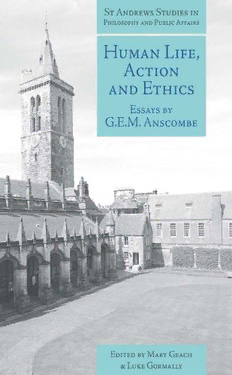Table Of ContentContents
Preface Luke Gormally
Introduction Mary Geach
Human Life
1 Analytical Philosophy and the Spirituality of Man
2 Has Mankind One Soul: An Angel Distributed Through Many
Bodies?
3 Human Essence
4 Were You a Zygote?
5 Embryos and Final Causes
6 Knowledge and Reverence for Human Life
7 The Dignity of the Human Being
Action and Practical Reason
8 Chisholm on Action
9 The Causation of Action
10 Practical Inference
11 Practical Truth
Ethics
12 Does Oxford Moral Philosophy Corrupt Youth?
13 Modern Moral Philosophy
14 Good and Bad Human Action
15 Action, Intention and ‘Double Effect’
16 The Controversy over a New Morality
17 Must One Obey One’s Conscience?
18 Glanville Williams’ The Sanctity of Life and the Criminal Law:
A Review
19 Who is Wronged? Philippa Foot on Double Effect
20 Prolegomenon to a Pursuit of the Definition of Murder: The Il-
legal and the Unlawful
21 Murder and the Morality of Euthanasia
22 Commentary on John Harris’ ‘Ethical Problems in the Manage-
ment of Severely Handicapped Children’
23 Sins of Omission? The Non-Treatment of Controls in Clinical
Trials
Human Life, Action
and Ethics
Essays by G.E.M. Anscombe
Editedby
MaryGeach andLukeGormally
IMPRINTACADEMIC
Copyright © M.C. Gormally, 2005
The moral rights of the authors have been asserted.
No part of any contribution may be reproduced in any form
without permission, except for the quotation of brief passages
in criticism and discussion.
Published in the UK by Imprint Academic
PO Box 200, Exeter EX5 5YX, UK
Published in the USA by Imprint Academic
Philosophy Documentation Center
PO Box 7147, Charlottesville, VA 22906-7147, USA
Digital edition converted and distributed in 2011
by Andrews UK Limited
www.andrewsuk.com
Cover Photograph:
St Salvator’s Quadrangle, St Andrews by Peter Adamson
from the University of St Andrews collection
For
PeterGeach
inhisninetiethyear
MaryGeach,adaughterofElizabethAnscombeandherliterary
executor, read Philosophy and Psychology at Somerville Col-
lege, Oxford, and wrote her doctoral dissertation at New Hall,
Cambridge.ShehastaughtphilosophyintheUSAandEngland,
butinrecentyearshasdevotedhertimetoherfamilyandtofree-
lancewriting.
LukeGormallyisaSeniorResearchFellowofTheLinacreCentre
for Healthcare Ethics, London, of which he was Director,
1981–2000,andaResearchProfessorofAveMariaSchoolofLaw,
AnnArbor,Michigan.Heistheeditorofsixpreviousvolumes
and the author of numerous papers, mostly in the field of
bioethics.
Preface
ThreevolumesofCollectedPapersbyElizabethAnscombewere
publishedin1981.1Thosevolumesbroughttogetheraselection
ofpaperspreviouslypublishedbetween1947and1979,together
with a small number of previously unpublished papers. The
presentvolumeisthefirstofwhat,itishoped,willbeanumberof
volumes bringing together a selection of hitherto uncollected
published papers along with some unpublished ones.2 Human
Life, Action and Ethics collects eighteen previously published
papers, together with five that have not hitherto appeared in
English;twoofthosehaveappearedinSpanish.
Theworkofcollectingandpreparingthepapersforthepresent
volumehasbeenbasedoninformationgatheredinthecourseof
cataloguing Professor Anscombe’s papers filed in her study at
herhomeinCambridge.Itshouldbeemphasisedthatthetaskof
cataloguing,forwhichmyprincipaldutieshaveleftfewopportu-
nities,isfarfromcomplete.Moreover,sinceProfessorAnscombe
wasnotaverysystematiccollectorofherownpapers,itispossi-
bletheremaybesomedepositedelsewhereofwhichshedidnot
keep copies. So there may be other papers of hers in existence
whichwouldhavequalifiedforinclusioninthisvolume.
[1] TheCollectedPhilosophicalPapersofG.E.M.Anscombe.Volume1:FromParmenidesto
Wittgenstein;Volume2:MetaphysicsandthePhilosophyofMind;Volume3:Ethics,
ReligionandPolitics(Oxford:BasilBlackwell,1981).
[2] ThecontentsofaprospectivevolumeonReligion,BeliefandPracticehavealready
beenidentifiedthoughnotyetpreparedforpublication.
x Human Life, Action and Ethics
ThemainfocusofHumanLife,ActionandEthicsisonProfessor
Anscombe’swritings inmoral philosophy.Thefirst partofthe
volumecontainsanumberofpaperswithsomerelevancetoher
understandingofthepropervaluationofhumanlife,atopicof
fundamentalimportancetoherworkinmoralphilosophy.The
second part contains two papers on the causation of human
action,andpapersonpracticalinferenceandpracticaltruth.The
thirdpartcollectstwelvepapers,rangingfrommoregeneraltop-
icsinmoralphilosophytoparticularsubstantiveethicalissues.
Wehaveincludedinthissectionthefamousandinfluential1958
paper on ‘Modern Moral Philosophy’ which has already
appearedinapreviousvolumeoftheCollectedPapers3andwhich
hasbeenanthologisedinanumberofvolumes.Itisincludedhere
forthebenefitofreadersnewtoProfessorAnscombe’sworkin
moralphilosophy;areadingofitwillservetothrowlightona
numberofotheritemsinthevolume.
Onepointshouldbenotedaboutthepresentationofthepapers
in thisvolume. Numberedfootnotesare Professor Anscombe’s
own,thoughinsomecaseswhataremerelybibliographicaldata
havebeenamplifiedbyme.Footnotesindicatedbyanasterisk(*)
arebyme.Forthemostparttheyprovideinformationaboutthe
originaloccasionofatextwhereIhavebeenabletoestablishthis;
details about the original publication of previously published
texts;andacknowledgementstocopyrightownersinthecaseof
papersoverwhichProfessorAnscombedidnotretainthecopy-
right. Very occasionally I have provided a footnote indicating
alterations to previously published versions of the text where
theseseemtometobeauthorisedbyalterationsandcorrections
made in Professor Anscombe’shand tooffprints ortypescripts
onfile.InaveryfewplacesIhaveinsertedanobviouslymissing
word;theseinsertionsareindicatedbysquarebrackets.
[3] InVolume3:Ethics,ReligionandPolitics,pp.26-42.
Preface xi
It remains to acknowledge debts incurred in the editing of
thesepapers.IamverygratefultothetwoinstitutionstowhichI
belong—TheLinacreCentreforHealthcareEthics,inLondon,
and Ave Maria School of Law, in Ann Arbor, Michigan — for
allowingmetofindtimetoworkonthisproject.Withouttheir
moralandmaterialsupportitwouldhavebeenimpossible.Grat-
itude is owing toProfessor John Haldane for suggesting inclu-
sion of this volume in the series he is editing and thereby
ensuring its appearance at a much earlier date than had previ-
ouslyseemedlikely.Iamgratefultohimforalsoprovidinggen-
erous support in the initial stages of compiling the volume. I
would like to thank Jose Maria Torralba of the University of
Navarre at Pamplona, who is doing research on Professor
Anscombe’swork,for providingmewithcopiesof thetextsof
lecturesshegaveathisuniversityinthe1970sand1980s.
The greatest debt of gratitude is owing to Professor Peter
Geach not only for providing ready access to Elizabeth
Anscombe’spapersbutalsoforprovidinggenerousandconviv-
ialhospitalityontheoccasionsonwhichIwasworkingonthem.
InthelatterconnectionIowethanksalsotoMoreGeach.
Finally,ithasbeenapleasureandaprivilegetoworkwithmy
wifeineditingthiscollectionofhermother’spapers.Weareat
one in dedicating this volume to her father as a token of filial
affectioninhisninetiethyear.
LukeGormally
Introduction
‘Philosophy’,saidmymother,‘isthinkingaboutthemostdiffi-
cultandultimatequestions’.Shedefinedhersubjectinthisway
fortheuniversityprospectuswhenshewasaprofessoratCam-
bridge, in the chair which had been occupied by her teacher,
Wittgenstein. Some people might want to qualify the word
‘thinking’asitoccursinthisdefinition,butAnscombedidnotgo
inforaspecial,differentkindofthinking:asherdaughter,com-
inghomefromschool,Ilearnedfromthewayshemetmyown
philosophicalproblems(problemsarisingnotfromphilosophy
lessonsmostly,butfromconversationandfromtheschoolcur-
riculum)thatphilosophywas,asIputittomyself,‘justthinking’
—merelythinkingaboutcertaintopics.
SotoreadAnscombeyouneednokey,exceptwhensheisdis-
cussingsometextindetail:thenithelpstohavethebookitself.
However,youdohavetopaycloseattention.Herstylewasdense
and unrepetitive, and it is hard to know sometimes whether it
wouldbemoreclarificatorytogoontothenextsentence,orto
returntothepreviousone.Shedoesnotcarrythereaderalong,as
someauthorsdo(Newmanisanexample).Yetsomepeoplepre-
fer her sort of writing, like the confection panforte, all fruit and
nutsandnodough,verychewyandtough.
Notalltheessayshereareequallydifficult,however.Shedid
varyherstyleaccordingtoaudience.Oneworkherewasaradio
talk. She was given the title ‘Does Oxford Moral Philosophy

